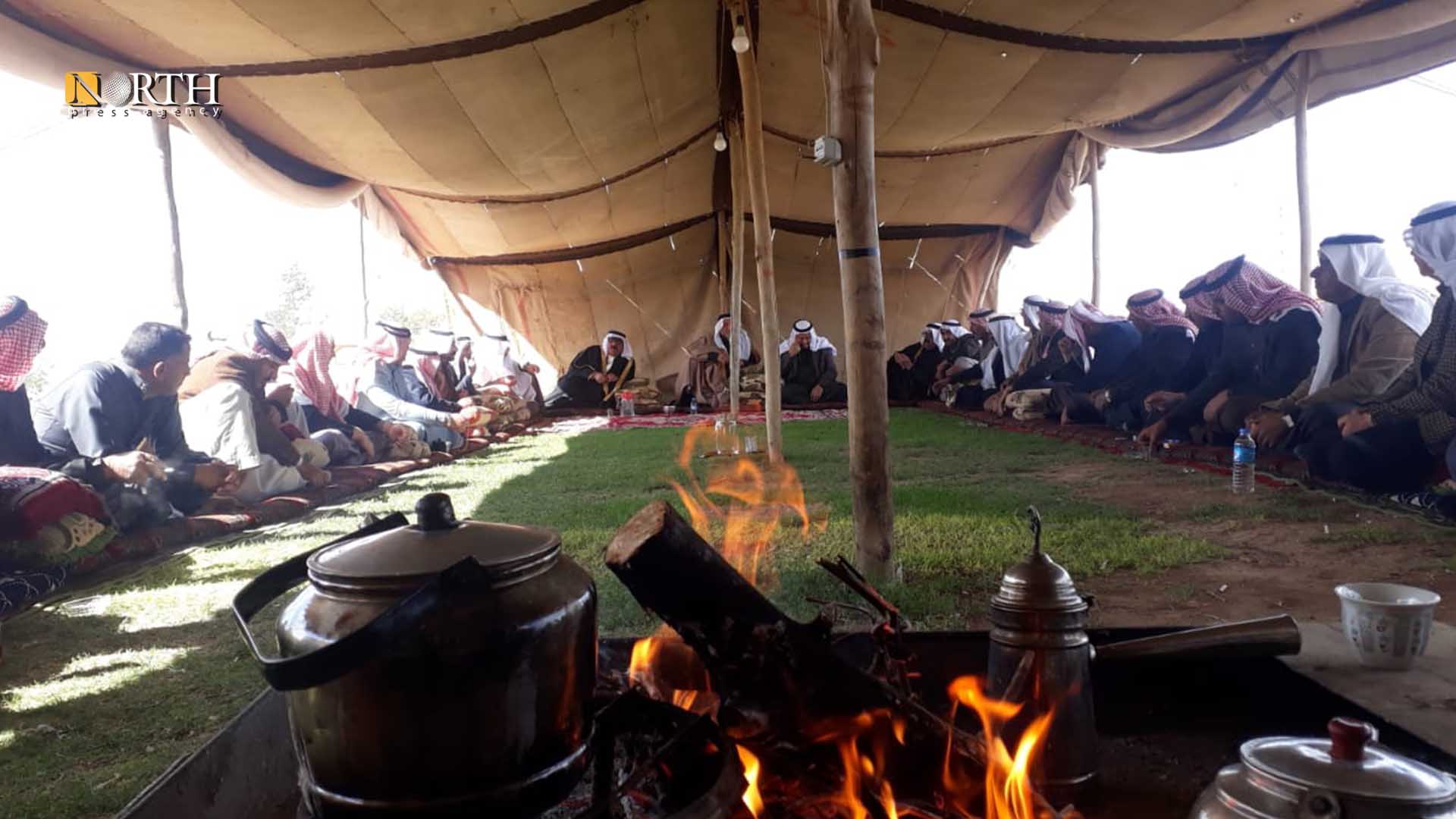TEL KOCHAR, Syria (North Press) – Suleiman al-Saray, a resident of the village of Umm Keheif in the countryside of Tel Kochar (al-Yaroubiya), northeastern Syria, remembers how his brother’s killers were punished in 2012 according to the tribal traditions.
He said that a gang of thieves deceived his brother, who was a driver. The theives claimed to be travelers and wanted his brother to drive them from the town of Girke Lege to the city of Raqqa, but they killed him and threw him in a deserted region to steal his car.
Al-Saray said that after the incident, he resorted to the tribal judiciary to punish the assailants.
Al-Saray belongs to the Shammar tribe, which along with other tribes in northeastern Syria, depends on the tribal judiciary to solve family disputes and hold the perpetrators accountable.
“Identifying the perpetrators began after I recognized my brother’s car that was sold to a man in the city of Shaddadi,” al-Saray said.
After they denied their crime, the accused were called to the tribal judiciary according to the traditions, where the judge was able to extract the confession from them after showing them evidence.
The perpetrators were sentenced by Ibn al-Sa’adi, the tribal judge, to a diyah of killing four men because of the perpetrators’ treachery, in addition to paying the price of the car.
The diyah is a sum of money – agreed upon between the two sides – paid to the victim’s family to bring the dispute to an end and prevent the start of cyclical revenge.
The Syrian civil war has produced several disputes and problems due to the lack of security in many regions, not to mention the inability of civil courts and their executive authorities to prosecute perpetrators in regions under the control of different powers.
Dignitaries and tribal judges believe that the courts of the Syrian regime and its laws could not limit people’s engagement with the tribal judiciary, the matter that Ibn al-Sa’adi attributes to the submission of the tribal community to social shame more than any other thing.
The Autonomous Administration of North and East Syria often depends on reconciliation between the two sides without resorting to harsh and long-term punishment.
“The tribe, like the state, has executive authority represented by the sheikh of the tribe and a judicial authority represented by the famous houses of custom,” Hachem al-Rakkad, 66, a resident of the village of Tuweresh in the countryside of Tel Kochar said.
The tribal judiciary is an inherited authority within the family, and no one has the right to influence nor veto the ruling.
In addition to the tribal judiciary, there are other inherited customs and traditions that contribute to ending bloodshed and preventing killing.
For example, in some cases the killer seeks refuge with an influential man until he leaves the tribe’s areas of influence, and in other cases, the family of the killer leaves their homes and area and goes to another tribe pending reconciliation or payment of diyah.
Khalil Sanad Ibn Sa’adi, a 71-year-old tribal judge from the Shammar tribe, said that the judicial decisions in the Syrian Desert were and still are the decisive factor in resolving individual and tribal disputes for centuries.
He described the judiciary between the tribes as “a very strict authority that derives its power from cross-border inherited customs.”
“The law of the Desert is an ancient law that dates back hundreds of years, is subject to the judge’s jurisprudence, and derives its rules from Islamic Sharia and customs,” Ibn Sa’adi added.
The sheikh of the Shammar tribe, al-Hameidi al-Amsah al-Jarba, was the one who restricted the judiciaries of the Shammar tribe in the 18th century CE to three families: Ibn Sa’adi, Ibn Amoud, and Ibn Ajeil (who are in Iraq), according to Ibn Sa’adi.
Ibn Sa’adi noted that every person from these families has experience, intelligence, and the right to gain people’s trust and assume the responsibility of the judiciary.
The families of judges sometimes include more than one judge, and there is no stable mechanism for choosing the judge. However, the eldest person who already has the knowledge required makes his choice subject to consensus within the family.
Ibn Sa’adi also said that the tribal judges of the Shammar are not specialized in solving the cases of their tribe only. Rather, they enjoy the confidence of all Arab tribes who are subject to the laws of the tribal judiciary.
“Most of the cases that come from Deir ez-Zor, Raqqa, and Shaddadi are not of the Shammar tribe, but rather belong to other tribes, such as al-Akkidat, al-Baqara, al-Jebour, al-Afadelah and others,” he stated.
The culture of tribal litigation is common among the rural and urban residents of Arab families. Kurdish and Christian families rarely resort to this type of judiciary, except in the case that they are involved with someone who belongs to the families that rely on tribal judiciary.
The final judgment may be acquired from one session if evidence and witnesses are available, but some complex cases may extend to more than one session, and the session may extend for several hours.
Ibn Sa’adi stressed that the tribal judge does not have the authority to implement the judgments, “but the power of right imposes itself, especially in the cases of murder and the related procedures such as paying diyah.”

